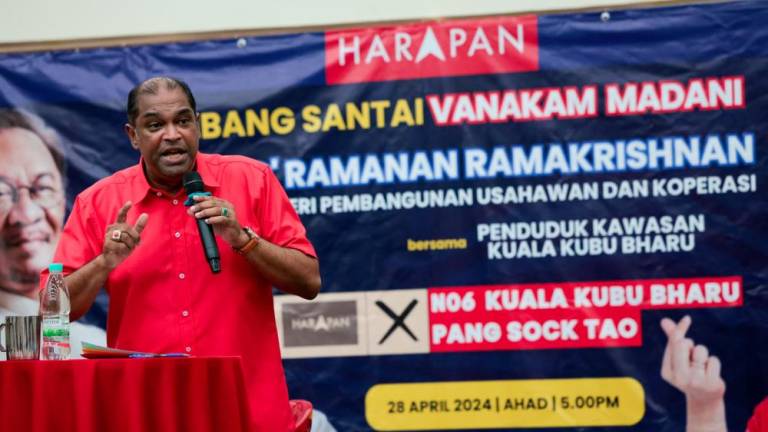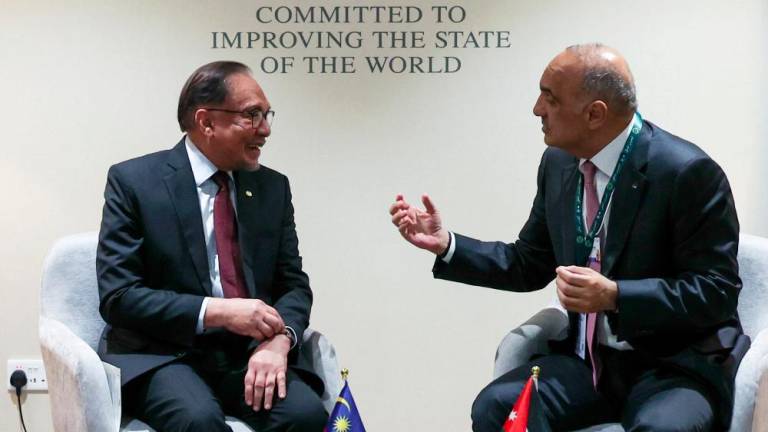IT is disconcerting to note that we hit a record high in Covid infections of 17,045 new cases yesterday, with 92 deaths after recording nearly 200 deaths earlier. This is despite the lockdown since June 1.
Health Director-General Tan Sri Dr Noor Hisham Abdullah has attributed these recent increases partly to the rising dominance of the Delta variant.
Notwithstanding that we have limited genomic sequencing capacity, the rapidly rising number of infections and deaths do reflect the scenario faced by countries in Europe and the United States as the Delta variant quickly takes over as the dominant strain.
We are fortunate that we can learn from the situations and experiences in Europe, especially the United Kingdom, and also the United States regarding the impact of the Delta variant.
We can sieve through the latest information that is available at the click of a button. All the latest statistics are readily available for us to make informed decisions to tackle the rising prevalence of the Delta variant locally. All we need is to learn from their experiences and adapt these to our local situation.
There are certain important facts to note about the Delta variant. It spreads quickly in the air and has a higher load factor accompanying it compared with other strains, making it more easily transmissible – hence, we see a very short timeframe for it to become the dominant strain where it is detected.
Fortunately, it does not appear to be more deadly than the existing strains, but mortality rates are inevitably higher because of the substantial increase in the number of infections. The infection among children, although low, is rising but mercifully, their mortality rate and hospitalisation needs remain low compared to adults.
Another piece of good news is that the current vaccines used are generally adequate to curb infection and hospitalisation for those who are fully vaccinated.
However, recent research emanating from Hong Kong shows that those receiving the neucleotide-based vaccine produces substantially higher levels of antibodies compared to inactivated virus type vaccine. There may, therefore, be a need for a booster dose for those fully vaccinated with the deactivated virus type of vaccine.
We see countries like Thailand and Indonesia considering a mix and match vaccine strategy. Israel, which has 58.4% of its population fully vaccinated, is also recommending a booster dose for those with compromised immune systems manifested by low antibody counts.
Another important point to note is that the Delta variant is now reported in 111 countries. The World Health Organisation has declared that it will dominate the world in the next
few months.
It has quickly assumed dominance in Europe and the US. Cases in Europe are expected to spike by Aug 1 and its disease agency is expecting five times more cases. Between July 5 and 11, the number of new cases in the European Union jumped by over 60%, increasing for the second week in a row due to relaxation of measures in the EU countries and increasing spread of the Delta variant.
In the UK, 55.2% of the population have been fully vaccinated. The Delta variant forms about 98.9% of the sequenced samples over the last month. There is still no sign of an increase in deaths well after the strain has become dominant. The message is clear: Get vaccinated.
In the US, 49.4% of the population have been fully vaccinated as of July 22. The vaccination rate has slowed significantly. The Delta variant last Tuesday accounted for more than 83% of new cases compared with 30% just a month ago.
After declining steeply for six months in the US, new cases are on the rise again because of the Delta variant. These are up by 70% in just a week and hospitalisations and deaths are up by nearly 36% and 26%, respectively. Surges are most pronounced in areas where vaccination rates are low and unvaccinated people are being hit hardest.
An unusual situation is seen in India, which has bucked the trend compared to other countries. The virus was raging in April and May when India reported 400,000 new cases and 4,000 deaths daily.
Since then, the daily incidence has declined sharply and was down to 38,033 cases on July 22, notwithstanding that only 6.3% of its population have been fully vaccinated.
A government study suggested that up to two-thirds of India’s population may have been infected with the virus. This was based on the blood serum survey of 29,000 people in June and July, which showed 67.6% of those tested had antibodies. This is good news for India, which has paid a heavy price to reach apparent herd immunity.
We may recall that Sweden initially elected to regard the virus like an ordinary flu and did not take extra precautionary measures when the pandemic first hit Europe.
Another significant development in India concerns the treatment of Covid patients. A better understanding of how the virus acts following infection and how the body responds has enabled better treatment protocols, which resulted in better survival rates.
Dr Mathew Varghese clearly explained the findings in “Managing Covid-19 through timelines” that is available on YouTube. It is worthwhile for our Health Ministry to take note of this development and adopt these protocols if it has not already done so.
Notwithstanding the Indian experiences, vaccination vastly reduces the number of new cases and deaths. The clearest example is Britain, where the Delta variant has spread widely and accounts for more than 90% of new cases. It is the best tool available to us in mitigating the spread and transmission of the Delta variant, and restore normalcy. This is a race between the vaccine and the variant.
Malaysia has 16% of its population fully vaccinated and reached a record daily vaccination of 500,000 recently. All credit must be accorded to the Covid-19 Immunisation Task Force (CITF) for this achievement, which must rank Malaysia among the top countries in rolling out its vaccination programme.
“Operation Surge Capacity” that was launched about a week ago, targets to have all adults in Kuala Lumpur and Selangor vaccinated by Aug 1. This is a laudable decision because these two areas have accounted for about half the daily new cases and deaths in the nation in recent times. This should help to relieve the pressure on health facilities, especially in the Klang Valley, which have been overwhelmed.
We can ramp up our vaccination programme further and reach herd immunity faster if we can implement 24/7 vaccination where feasible. We have enough vaccine doses lined up for the next two months, and also an additional 14 million doses available from Pharmaniaga to tap on between now and September if needed.
We have all the facilities available at vaccination centres. What is needed is for CITF to rope in more retired medical staff, Rela volunteers and other supporting staff to man the night shifts.
I have suggested 24/7 vaccination in early June. Had we implemented this then, we may have been able to avoid the record number of new cases and deaths that we are experiencing now.
We have a narrow window to implement 24/7 before the Delta variant’s rapid spread overwhelms the nation, causing more deaths and paralysing our health services, and further damaging our economy.
A notable point is that we need to vaccinate 55% of the adult population as seen in the UK to bring down the deaths to a minimal. Even when 50% of the population were vaccinated in the US, infections and deaths continued to rise. We have managed to exceed daily 500,000 vaccinations. Let us step up a gear by introducing night vaccinations.
In addition, the MOH should continue to encourage all private hospitals, and both public and private clinics to provide vaccination to all walk-ins. Also make it convenient for the public to get their vaccinations.
Continue to provide more drive-through and mobile vaccination units to service the people in the kampungs, factory workers, service providers, other categories of workers, as well as college students when they resume their classes physically, so that those above 18 can be vaccinated more quickly.
The prime minister has talked about offering the “carrot” to those who are fully vaccinated. Perhaps we should also consider using the “stick” by depriving people who refuse to get vaccinated by end of September, access to shopping outlets, entertainment centres and other public amenities.
We can still beat the Delta variant!
Dr Ho Chai Yee
(Citizens Network for a Better Malaysia)
Comments: letters@thesundaily.com









